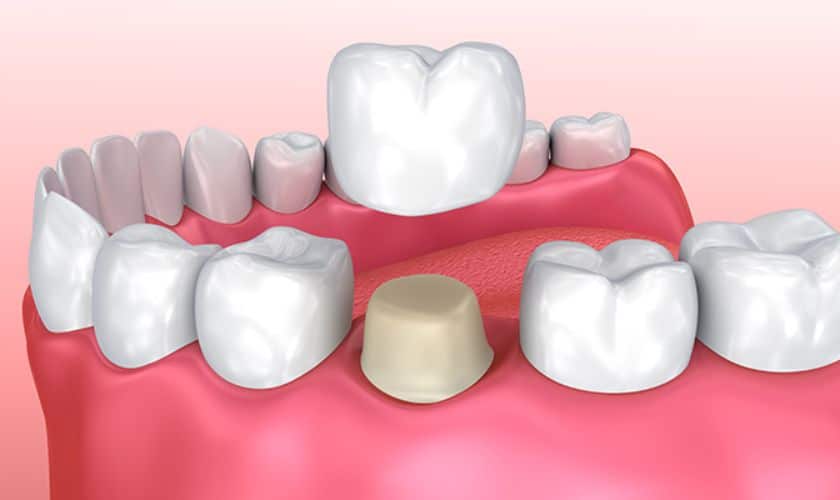Published on July 27, 2023

Porcelain crowns are a popular dental restoration option that can address various dental issues, such as damaged, discolored, or misshapen teeth. While they offer numerous benefits, it is essential to weigh their pros and cons to decide if they are the right choice for your specific dental needs. This comprehensive guide delves into the advantages of porcelain crowns, such as natural aesthetics, durability, and biocompatibility, as well as the potential drawbacks, like cost and potential wear on opposing teeth. By understanding these factors, you can make an informed decision with your dentist’s guidance and achieve a healthy, functional, and aesthetically pleasing smile.
Source : Hygiene Edge
Pros of Porcelain Crowns
1. Natural Aesthetics: Porcelain crowns are crafted to closely resemble the appearance of natural teeth, providing a seamless and natural-looking smile.
2. Durability and Longevity: Porcelain crowns are known for their exceptional strength and resilience, making them a durable dental restoration that can last for many years with proper care.
3. Biocompatibility: Porcelain crowns are biocompatible and well-tolerated by the body, reducing the risk of adverse reactions or allergies, making them a safe choice for most patients.
Cons of Porcelain Crowns
1. Cost: Porcelain crowns can be more expensive compared to other dental restoration options, which may be a consideration for individuals on a tight budget.
2. Wear on Opposing Teeth: Due to their hardness, porcelain crowns can cause increased wear on the opposing teeth over time, particularly in individuals with habits like teeth grinding.
3. Potential Fractures: While porcelain crowns are durable, they can be prone to chipping or fracturing if subjected to excessive force or trauma, requiring potential repair or replacement.
Factors to Consider
1. Dental Health and Condition: Consider the current state of your dental health, the extent of the dental issue, and whether a porcelain crown is the most appropriate solution.
2. Budget and Insurance Coverage: Evaluate your financial resources and insurance coverage to determine if the cost of porcelain crowns fits within your budget.
3. Lifestyle and Habits: Take into account lifestyle habits, such as teeth grinding or clenching, as these may impact the longevity of porcelain crowns. Discuss these habits with your dentist to explore potential solutions or alternatives.
Consultation with a Dentist
Scheduling a consultation with a dentist is a crucial step in determining whether porcelain crowns are the right choice for you. During the consultation, the dentist will carefully assess your dental health, discuss your concerns, and explain the benefits and limitations of porcelain crowns. They will also evaluate your bite alignment and assess any potential issues that may affect the success of the treatment. The dentist will provide personalized recommendations based on your specific needs and goals, helping you make an informed decision about whether to proceed with porcelain crowns or explore alternative options. Don’t hesitate to ask questions and express any concerns during the consultation to ensure clarity and peace of mind.
Case Studies and Patient Experiences
Case studies and patient experiences can provide valuable insights into the benefits and outcomes of porcelain crowns. Real-life examples showcase how individuals with various dental issues achieved improved aesthetics and functionality through porcelain crowns. These studies often include before-and-after photos, highlighting the transformative effects of the treatment. Patient testimonials offer firsthand accounts of their experiences, including the procedure process, comfort level, and satisfaction with the final results. Reading about others’ journeys with porcelain crowns can help prospective patients gain confidence in the treatment and better understand the potential benefits and challenges. Remember that each case is unique, and consulting with a dentist is essential to determine the best approach for your individual needs.
Some FAQs include:
1. How long do porcelain crowns typically last?
Porcelain crowns can last for many years, often between 10 to 15 years or even longer with proper care and maintenance.
2. Is the process of getting porcelain crowns painful?
The process of getting porcelain crowns is generally not painful. Local anesthesia is administered during the procedure to ensure patient comfort.
3. Can porcelain crowns stain or discolor over time?
Porcelain crowns are highly resistant to staining, but they may develop slight discoloration over an extended period. Regular oral hygiene practices can help maintain their appearance.
4. Are there any restrictions after getting porcelain crowns?
After getting porcelain crowns, patients may need to avoid biting or chewing on hard objects to prevent potential damage to the crowns.
5. Are there alternatives to porcelain crowns for dental restoration?
Yes, there are alternatives to porcelain crowns, such as dental bonding, dental veneers, and metal crowns. Your dentist will recommend the best option based on your specific dental needs and preferences.
In conclusion, porcelain crowns offer numerous benefits, including natural aesthetics, durability, and biocompatibility. However, it is essential to consider factors like cost and potential wear on opposing teeth. Consulting with a dentist, reviewing case studies, and understanding patient experiences can guide you in making an informed decision. With proper care and professional guidance, porcelain crowns can provide a long-lasting and aesthetically pleasing dental restoration for your smile.
